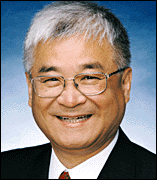

![]()
Pacific Perspective


![]()
Pacific Perspective
The Tokyo Stock Exchange could not report the price/earnings ratio (also known as the earnings multiplier) of Tokyo-listed companies in 1999 because a simple average of earnings per share was negative. Tokyo market slump may
bring devastating consequencesIt was able to report the ratio in 2000, but it was a whopping 171. This means that the Tokyo market values its listed stocks at 171 times their average earnings per share.
During a bull market period when stock prices are steadily increasing, a high price/earnings ratio is good news for investors.
However, an extreme high ratio during a bear market period is worrisome because the ratio shoots up as corporate earnings fall.
The ratio for New York Stock Exchange stocks is about 25, which is a lot more comforting than what we observe in Tokyo.
Japan is the only major economy with a negative inflation rate. Last year, the Gross Domestic Product deflator, the broadest inflation measure, declined by 1.7 percent.
The Consumer Price Index fell another 0.6 percent in June, the 22nd consecutive month of decline.
With deflation in full swing, land prices are falling and the corporate profit picture appears bleak.
Despite the zero-interest rate policy, Japanese corporations are reluctant to borrow in fear of hard times ahead. Consumers do not spend because they are worried about job security.
Japan's unemployment rate of 4.9 percent is the highest since World War II.
Recently, the International Monetary Fund predicted Japan government debt is expected to reach 140 percent of GDP and its fiscal deficit will hit 6.8 percent of GDP by the end of this year. Both figures are alarmingly high.
So, it is not surprising that the Tokyo stock market is ailing.
What kind of adverse consequences should we expect from the slumping stock market?
Japanese bank holdings of common stocks amount to &YEN33 trillion (or $260 billion), which account for approximately 10 percent of market capitalization of the Tokyo-listed companies.
As Japanese banks switch from a book-value to a market-value-based accounting system in late September, their earnings will erode further.
Additional corporate bankruptcies will increase non-performing loans, which are estimated at between $250 billion (official estimate) and $1.25 trillion (opposition party's estimate). Banks will be forced to sell their stock holdings to cover their capital base, further eroding the Tokyo stock market.
As the stock market continues its decline, the voice of the opposition to Prime Minister Junichiro Koizumi's reform programs will become louder even within his own Liberal Democratic Party.
If the reform programs slow down, Japan's economic stagnation will prolong.
While many economists and ordinary people in Japan believe Koizumi is the last hope for Japan's economic recovery, it is an unenviable task he and his cabinet will face in the coming months.
S. Ghon Rhee is the K.J. Luke Distinguished Professor of International Finance and Banking at the University of Hawaii College of Business Administration.